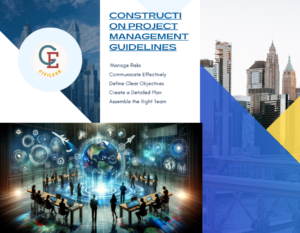Hey there, fellow builders and project enthusiasts. Today we are diving into the world of Complex Construction Projects management. It’s about bringing together a team of experts, keeping everyone in tune, and ensuring the final performance is a masterpiece. So, let’s talk about some tips for successfully navigation of Complex Construction Projects.
Clear Communication is Key: Imagine you are building a skyscraper in Mumbai. You’ve got architects, engineers, and contractors from all over the world working on it. Now, if everyone isn’t on the same page, chaos can ensue. That’s why clear communication is very important for Complex Construction Projects. Whether it is through regular meetings, emails, or project management software, make sure everyone knows their part and understands the overall vision.
Plan, Plan, Plan: Just take an example of the iconic Sydney Opera House. It took 16 years to build because the planning phase wasn’t thorough enough. So, before you even pick up a hammer, spend time planning every aspect of your project. From budgeting to scheduling to risk management.
Stay Flexible: Construction projects are like rollercoasters – full of unexpected twists and turns. Take, for example, the Panama Canal expansion project. It faced numerous setbacks, from geological challenges to labor strikes. Yet, by staying flexible and adapting to changing circumstances, they eventually succeeded. So, embrace change and be ready to pivot when needed.
Build a Reliable Team: Your project team is like your Avengers squad – each member brings their own superpower to the table. But just like in the movies, you need to ensure everyone works well together. Choose reliable partners and foster a collaborative environment where everyone feels valued and motivated to give their best.
Embrace Technology: Gone are the days of drawing blueprints by hand. Today, we have Building Information Modeling (BIM), drones, and virtual reality to help us visualize and manage Complex Construction Projects more efficiently.
Prioritize Safety: No project is worth risking lives. Whether you’re building a bridge in India or a stadium in Brazil, safety should always be your top priority. Invest in proper training, equipment, and protocols to ensure a safe working environment for everyone involved.
Learn from Mistakes: Construction projects are not immune to mistakes. Remember the Millennium Bridge in London.It famously wobbled on its opening day due to a design flaw. But instead of panicking, engineers learned from the experience and implemented corrective measures. So, don’t be afraid to admit when things go wrong. Use each setback as an opportunity to grow and improve.
Navigating Complex Construction Projects: A Guide for Success
Let’s imagine a big project, like building a new highway. First, a team of experts meets to plan everything. They decide the route, how many lanes, where to put exits, and how much it will cost. Then they talk to the government to get permission and money.
Once they have the green light, they hire lots of people – engineers, construction workers, and supervisors. Each person has a specific job, like designing the road, buying materials, or laying asphalt.
The Complex Construction Projects is split into smaller tasks, like clearing the land, building bridges, and paving the road. Each task has a deadline, and everyone works together to meet them.
During the project, things might go wrong – maybe it rains too much, or a machine breaks. But the team is ready. They have backup plans and extra workers to help.
Finally, after months or even years of hard work, the highway is finished. It’s a big celebration! The new road is safer and faster for everyone who uses it. And because the team stuck to the plan and worked together, they finished on time.
Complex Construction Projects Management guidelines
Absolutely, let’s break down some simple guidelines for construction project management:
Define Clear Objectives: Start by clearly defining what you want to achieve with the project. Is it building a new house, a bridge, or a shopping mall. Understanding the end goal will help you plan better.
Create a Detailed Plan: Once you know what you want to achieve, make a detailed plan. Break the project down into smaller tasks, set deadlines for each task, and allocate resources accordingly.
Assemble the Right Team: Surround yourself with a competent team of professionals who have the skills and experience needed for the project. This might include architects, engineers, contractors, and subcontractors.
Communicate Effectively: Good communication is essential for the success of any Complex Construction Projects. Keep everyone informed about their roles and responsibilities, project timelines, and any changes or updates.
Manage Risks: Identify potential risks and develop strategies to mitigate them. This could include factors like bad weather, budget overruns, or supply chain disruptions. Having a risk management plan in place will help you deal with unexpected challenges.
Monitor Progress: Keep a close eye on the progress of the project. Regularly check in with your team to ensure that tasks are being completed on time and within budget. Use project management tools and software to track progress and identify any potential issues early on.
Stay Flexible: Construction projects are dynamic and often subject to changes. Stay flexible and be prepared to adapt your plans as needed. This could involve adjusting timelines, reallocating resources, or making changes to the design.
Ensure Quality: Strive for excellence in every aspect of the project. Use high-quality materials, adhere to industry standards and regulations, and conduct regular quality inspections to ensure that the finished product meets your standards.
Manage Budget and Costs: Keep a close eye on the project budget and costs. Monitor expenses, identify areas where costs can be reduced, and avoid unnecessary spending. Be transparent with stakeholders about budgetary constraints and potential cost overruns.
Celebrate Success: Finally, take the time to celebrate milestones and successes along the way. Recognize the hard work and dedication of your team members, and acknowledge their contributions to the project.
By following these simple guidelines, you can effectively manage construction projects and increase the likelihood of success. Remember to stay organized, communicate effectively, and remain flexible in the face of challenges.
Role of civil engineer in Construction Project Management and Navigating Complex Projects :
The role of a civil engineer in construction project management and navigating complex projects is very important. Let’s break it down:-
Planning and Design: Civil engineers are responsible for planning and designing the construction project. They analyze site conditions, assess environmental impacts, and develop detailed plans and specifications for the project. This includes determining the best materials to use, designing structures to withstand various loads and forces, and ensuring compliance with building codes and regulations.
Project Coordination: Civil engineers play a key role in coordinating various aspects of the project. They work closely with architects, contractors, subcontractors, and other stakeholders to ensure that everyone is aligned with the project goals and timelines. This involves scheduling meetings, communicating project requirements, and resolving any conflicts or issues that arise during the construction process.
Resource Management: Civil engineers are responsible for managing resources such as materials, equipment, and labor. They help to procure materials, monitor inventory levels, and ensure that resources are allocated efficiently to meet project deadlines. They also oversee the hiring and supervision of construction workers, ensuring that they have the necessary skills and training to perform their jobs safely and effectively.
Quality Control: Civil engineers are responsible for ensuring that construction work meets quality standards and specifications. They conduct regular inspections of the work site, monitor construction progress, and identify any defects or deficiencies that need to be addressed. They also work closely with quality control inspectors and testing laboratories to ensure that materials meet quality standards and specifications.
Risk Management: Civil engineers play a key role in identifying and mitigating risks associated with construction projects. They assess potential hazards, such as geological conditions, environmental factors, and regulatory requirements, and develop strategies to minimize their impact on the project. They also monitor project budgets and timelines to identify any potential risks or issues that could affect project delivery.
Problem-Solving: Civil engineers are skilled problem-solvers who are adept at finding creative solutions to complex engineering challenges. They troubleshoot issues that arise during the construction process, such as design flaws, material shortages, or construction delays, and work with the project team to find practical solutions that keep the project on track.
Feel free to follow us there on Instagram and drop a comment to say hello!



